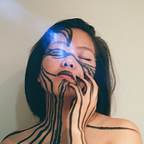My mother had a love for archeology.
In other words, she loved the idea of uncovering death with her bare hands. Death — the only certain thing, the only constant. She had a love for dusting away at the bones of animals and men, a reminder there are deaths worth living for.
When I take the time to look at my reflection, I search for my ma and pa. If someone were to look at any photo of both my parents they would see them both in me easily. Though my parents do not look alike, I somehow echo them together, as if my face were the resounding harmony of their essences. My father's prominent jaw and overbite. His button nose and large oval forehead. Mother’s fair skin and scowling brows. The way her eyes look chinky and whipped across her face. Even when she — we, smile, the top half of our face betray us; furrowing and choking at the thought of showing feelings beyond contempt.
Then again, there are many ways I look nothing like them. Papa’s face is hollowed out by time, skin weighing heavily over his cheekbones. His resting face looks like the aftermath of swallowing years of cries. Skin charred and cursed like his mother’s. The curse of being in between. Too dark to consider himself beautiful, too light to acknowledge that someone’s slurs about his skin are even racist at all.
When I explain racism to some of my white friends, they pin otherness against otherness. ‘But you’re not even black. Not even that dark.’ And I remember who the enemy is. Ignorance is a ghost that sifts loudly among us. A ghost too white for them to see. But I hear them, I do.
My father is a man with many ghosts. He can disguise himself as a racist, pinning minorities against themselves, because he too forgets his colour. Because he too creates the walls around the others and others’ others. Because it is easier to live the life of a prisoner to someone else’s ignorance when you keep prisoners yourself. Oppress the forward motion of society with the quiet scoff he makes at the black driver who speeds past him in traffic or at the young black boys playing basketball late into the evening.
“Where are their parents? How could you let your children out so late where there are so many dangers” he would wonder. And I see both the longing and dementia in his face when he looks at them. These boys who he thinks are complete strangers.
My father used to be a basketball coach. He would play in the streets until the next morning. Knowing exactly where his mother and stepfather were. Knowing the dangers weren't out on the basketball court but locked in the home filled with the musk of alcohol. A home that cracked at the sound of his fathers' voice.
Where are you, ma? he would think. How could you let your children come home where there are all these monsters?
The thought is ironic, but I know my father only wants us safe in a safety he never knew, a safety he’s learning to find in his children and his wife. A safety he hasn't learned to trust yet. But I do. I trust it.
When I was in middle school, my mother had a series of mini-strokes. Over the years the left side of her face has slowly decided to slide off itself. Now her face never has to force its frown. The wrinkles around her mouth and crow's feet are stamped on by the many hours she spends a day in prayer. An act I myself never learned how to do with much promise. Mama looks for herself in me often. She can stare at my face, puzzled for long minutes looking for where she is, laughing at how much I remind her of both my father and her own secret twin, one she killed long ago.
I know she wonders what the years have turned me into. She wonders why I am so concerned with the world and what I could have possibly seen in life to make me a feminist. She laughs at my concern for the environment and sea turtles and my concern for my little brother. She laughs because it's like meeting a childhood friend, or going back to a place she left long ago. Like meeting her own form of ghosts. She laughs because she knows what it takes to be concerned for the world, what it is like to wake up in tsunamis and war and around men with wandering hands.
When she looks at me, ma curses herself for giving me all the wrong parts. The parts that feel, the ones that care too much, the ones that make me annoying. The parts of her that got me talking over drunk boys at the parties about my right to sit at the same table as them. While they gurgle their beers to drown out the sound of this annoying Asian girl. They probably wonder
where does she even come from?
And I’ll gladly tell them.
